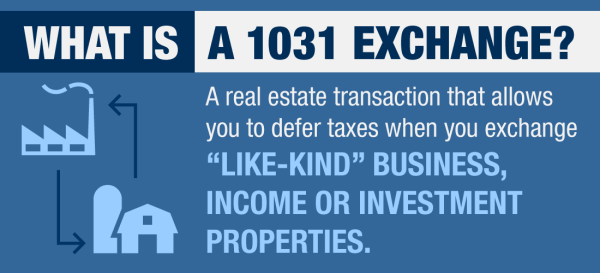Things to Know Before Buying a 1031 Exchange Property
by Michal Ben-Moshe, Senior Marketing Director
Posted on July 20, 2017 at 16:00 PM
SHARE POST

About 1031 Exchanges
1031 exchange is an IRC Section that allows an investor to sell a business or investment asset to reinvest in a new property within a short statutory time period. Because the 1031 exchange is treated as an exchange and not a sale, you either have no tax or limited tax due at the time of the exchange.
1031 Exchange Benefits
As an investor, there are many benefits in getting into a 1031 exchange. First, as mentioned above the 1031 process allows the investor to defer ordinary income, depreciation recapture and/or capital gain taxes. These types of taxes can be quite significant.
Second, by deferring taxes, the investor will have more equity available and will be able to exchange into an investment with significantly higher benefits than the original property. That allows him to accumulate significant portfolio growth and increase return on investment. "The 1031 exchange is a great tool to accumulate wealth and assets", says Leeor Ben-Moshe a co-founder at the Ben-Moshe Brothers Group of Marcus & Millichap. "Investors can sell a property that is not non-depreciable or producing low income, such as land, and acquire property that can be depreciated or with greater cash flow performance, such as a triple-net (NNN) single-tenant investment or a retail shopping center."
Third, Investors who own a property requiring extensive maintenance costs and intensive management, can reinvest in properties requiring little or no management.
Fourth, investors can create diversification and consolidation by expanding the number or types of property in their portfolio or purchasing one larger property instead of some smaller properties.
1031 Exchange Regulation
Despite all of those advantages, the 1031 exchange regulations are strict and there are few complications in the law that the investor need to understand. In order to access the full potential of these benefits, it is crucial to have a comprehensive knowledge when doing a 1031. Still, if you’re considering a 1031 we concentrate some important information about the process for you.
First thing first, a 1031 is apply only on real estate property held for business use or investment and not for personal residence. Primary residence do not qualify for 1031 exchange process and vacation or second homes, which are not held as rentals, do not qualify in most cases. A fix-and-flip-property can't be exchanged too, because it fits in the category of property being held for sale.
Second, time is crucial. The investor must identify in writing a potential Replacement Property within 45 days from the selling of the original property. In addition, the investor must close on the new property within 180 days of the sale of the old. For example, If the investor designate replacement property exactly 45 days later, he will have 135 days to close on the replacement property. Those time periods are not negotiable and the IRS will not make exceptions.
Third, the investor can multiple replacement properties. Alternatively, the investor can designate more properties if he comes within certain valuation tests.
At last, if the investor has cash left over after selling the original property the cash will be taxed as partial sales proceeds from the sale of the property, generally as a capital gain.
© The content provided in this article is owned by The Ben-Moshe Brothers of Marcus & Millichap and is subject to Copyright Laws.
For Latest Updates